最新七年级下册英语第五单元知识点整理
- 格式:doc
- 大小:26.50 KB
- 文档页数:3
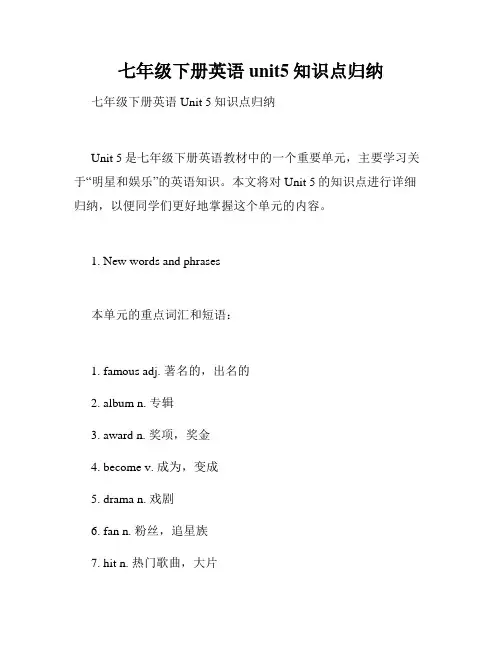
七年级下册英语unit5知识点归纳七年级下册英语Unit 5知识点归纳Unit 5是七年级下册英语教材中的一个重要单元,主要学习关于“明星和娱乐”的英语知识。
本文将对Unit 5的知识点进行详细归纳,以便同学们更好地掌握这个单元的内容。
1. New words and phrases本单元的重点词汇和短语:1. famous adj. 著名的,出名的2. album n. 专辑3. award n. 奖项,奖金4. become v. 成为,变成5. drama n. 戏剧6. fan n. 粉丝,追星族7. hit n. 热门歌曲,大片8. magazine n. 杂志9. movie n. 电影10. performance n. 演出,表演11. popular adj. 受欢迎的,流行的12. singer n. 歌手13. talent n. 天赋,天才14. TV show n. 电视节目2. Grammar本单元的语法重点:1. Be动词的用法:am/is/are例如:I am a fan of Justin Bieber.He is a famous singer.We are going to watch a movie tonight.2. 一般现在时的第三人称单数形式:一般情况下,一般现在时的动词加s,但是词尾是s、x、sh、ch结尾的动词要加-es。
例如:She loves to watch TV shows.My brother listens to pop music.Tom watches a lot of drama on TV.3. 物主代词的用法:我的 + 名词:my 名词你的 + 名词:your 名词他的 + 名词:his 名词她的 + 名词:her 名词我们的 + 名词:our 名词你们的 + 名词:your 名词他们的 + 名词:their 名词例如:This is my album.That is her TV show.Their performance was amazing.3. Sentence patterns本单元的句型重点:1. I am a fan of...例如:I am a fan of Justin Bieber.I am a fan of superhero movies.2. He/She is a famous...例如:She is a famous singer.He is a famous actor.3. He/She became famous because...例如:He became famous because he won an award.She became famous because she starred in a hit movie.4. Do you like...?例如:Do you like pop songs?Do you like to watch TV shows?4. Listening and speaking本单元的听说重点:1. 用英语发表关于自己最喜欢的歌手、电影或电视节目的简短演讲。
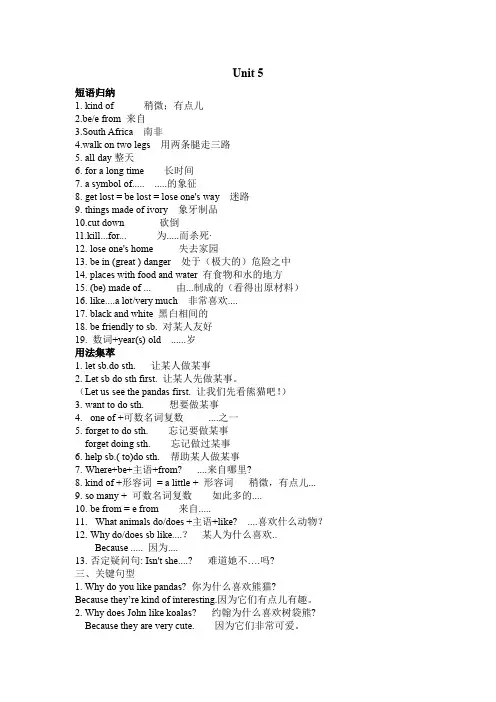
Unit 5短语归纳1. kind of 稍微;有点儿2.be/e from 来自3.South Africa 南非4.walk on two legs 用两条腿走三路5. all day整天6. for a long time 长时间7. a symbol of..... .....的象征8. get lost = be lost = lose one's way 迷路9. things made of ivory 象牙制品10.cut down 砍倒11.kill...for... 为.....而杀死·12. lose one's home 失去家园13. be in (great ) danger 处于(极大的)危险之中14. places with food and water 有食物和水的地方15. (be) made of ... 由...制成的(看得出原材料)16. like....a lot/very much 非常喜欢....17. black and white 黑白相间的18. be friendly to sb. 对某人友好19. 数词+year(s) old ......岁用法集萃1.let sb.do sth. 让某人做某事2.Let sb do sth first. 让某人先做某事。
(Let us see the pandas first. 让我们先看熊猫吧!)3.want to do sth. 想要做某事4.one of +可数名词复数....之一5.forget to do sth. 忘记要做某事forget doing sth. 忘记做过某事6.help sb.( to)do sth. 帮助某人做某事7.Where+be+主语+from? ....来自哪里?8.kind of +形容词= a little + 形容词稍微,有点儿...9.so many + 可数名词复数如此多的....10.be from = e from 来自.....11.What animals do/does +主语+like? ....喜欢什么动物?12.Why do/does sb like....?某人为什么喜欢..Because ..... 因为....13.否定疑问句: Isn't she....? 难道她不….吗?三、关键句型1. Why do you like pandas? 你为什么喜欢熊猫?Because they’re kind of interesting.因为它们有点儿有趣。
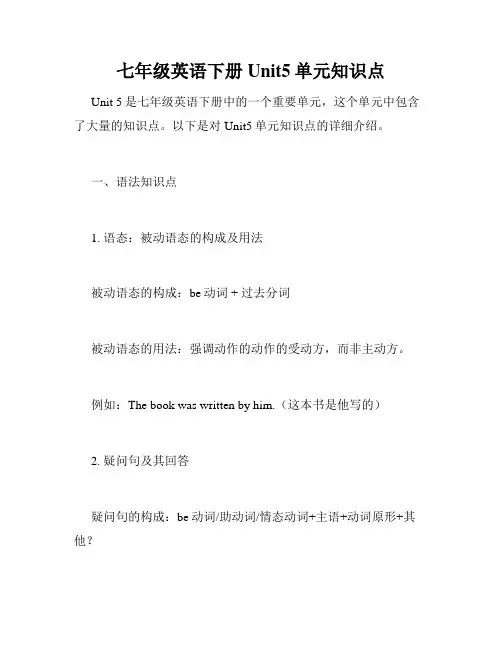
七年级英语下册Unit5单元知识点Unit 5是七年级英语下册中的一个重要单元,这个单元中包含了大量的知识点。
以下是对Unit5单元知识点的详细介绍。
一、语法知识点1. 语态:被动语态的构成及用法被动语态的构成:be动词 + 过去分词被动语态的用法:强调动作的动作的受动方,而非主动方。
例如:The book was written by him.(这本书是他写的)2. 疑问句及其回答疑问句的构成:be动词/助动词/情态动词+主语+动词原形+其他?Yes/No + 主语 + be动词/助动词/情态动词。
例如:- Are you a student?- Yes, I am.- Do you like hamburgers?- No, I don’t.3. 特殊疑问句及其回答特殊疑问句的构成:疑问词(who/what/where/when/why/how)+ be动词/助动词/情态动词+主语+动词原形+其他?疑问词 + 主语 + be动词/助动词/情态动词。
例如:- What is your favorite color?- My favorite color is blue.- Where do you live?- I live in New York.二、词汇知识点1. 动词短语动词短语是指由动词和其它成分组成的短语,常用于描述动作、状态或动作的完成情况等。
例如:look after(照顾)、enjoy doing(喜欢做某事)、get up (起床)2. 形容词形容词是指用来修饰名词或代词的词语,可以描述名词或代词的性质、特点等。
例如:happy(快乐的)、hungry(饥饿的)、dirty(脏的)3. 名词名词是指用来表示人、事、物、地点等的词语,常用于构成句子的主语、宾语等成分。
例如:book(书)、teacher(老师)、classroom(教室)三、阅读理解阅读理解是指通过阅读一段文章,理解其中的意思并回答问题的能力。
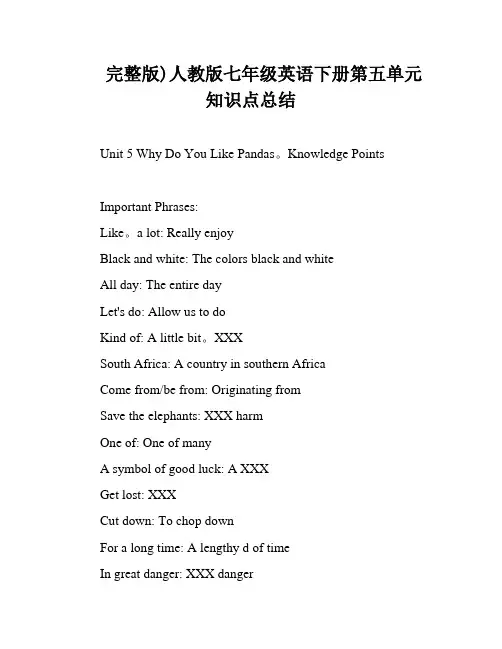
完整版)人教版七年级英语下册第五单元知识点总结Unit 5 Why Do You Like Pandas。
Knowledge PointsImportant Phrases:Like。
a lot: Really enjoyBlack and white: The colors black and whiteAll day: The entire dayLet's do: Allow us to doKind of: A little bit。
XXXSouth Africa: A country in southern AfricaCome from/be from: Originating fromSave the elephants: XXX harmOne of: One of manyA symbol of good luck: A XXXGet lost: XXXCut down: To chop downFor a long time: A lengthy d of timeIn great danger: XXX dangerXXX ivory: XXXPlaces with food and water: XXX sustenanceKill。
for: To take the life of an animal for a specific purpose1.Seeing Pandas: Observing pandas2.My Favorite Animals: XXX XXX3.e to SP: Greetings to SP4.e Back to SP: Greetings to SP upon returning5.From: Originating from6.In the Zoo: Located in a zoo7.On the Farm: Located on a farm8.My New Pet: XXX9.XXX: Bipedal movement10.Kind of: XXX11.Kind of Interesting: XXX12.A XXX: XXX13.A Little Boring: XXX14.A Kind of: A type of15.All Kinds of: Many different types of16.All Day: The entire day17.A Good Name for XXX: A fitting name for a person18.South Africa: A country in southern Africa19.South China: The southern n of China20.South America: The southern n of the Americas21.America。
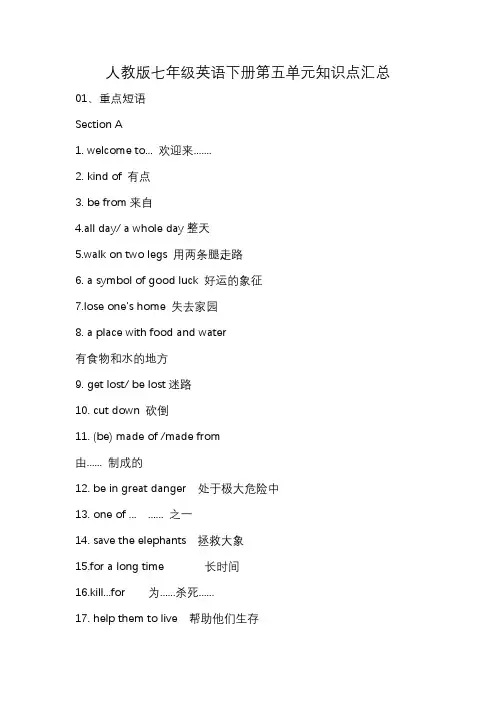
人教版七年级英语下册第五单元知识点汇总01、重点短语Section A1. welcome to... 欢迎来.......2. kind of 有点3. be from来自4.all day/ a whole day整天5.walk on two legs 用两条腿走路6. a symbol of good luck 好运的象征7.lose one’s home 失去家园8. a place with food and water有食物和水的地方9. get lost/ be lost迷路10. cut down 砍倒11. (be) made of /made from由...... 制成的12. be in great danger 处于极大危险中13. one of ... ...... 之一14. save the elephants 拯救大象15.for a long time 长时间16.kill...for 为......杀死......17. help them to live 帮助他们生存18.really scary很吓人19. South Africa 南非02、重点句子Grammar Focus 句子1. Why do you like pandas?你为什么喜欢熊猫?Because they’re kind of interesting.因为他们有点儿有趣2. Why does John like koalas?约翰为什么喜欢考拉?Because they’re very cute.因为它们非常可爱。
3. Why don’t you like tigers?你什么不喜欢老虎?Because they’re really scary.因为他们确实吓人。
4. Where are lions from?狮子来自哪里?They’re from South Africa.他们来自南非。
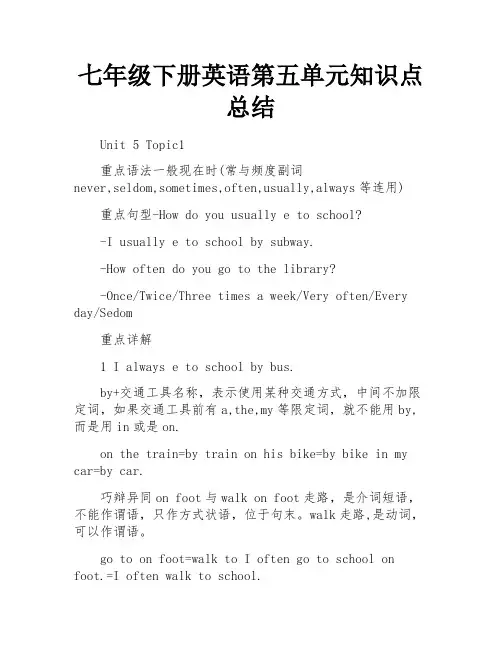
七年级下册英语第五单元知识点总结Unit 5 Topic1重点语法一般现在时(常与频度副词never,seldom,sometimes,often,usually,always等连用)重点句型-How do you usually e to school?-I usually e to school by subway.-How often do you go to the library?-Once/Twice/Three times a week/Very often/Every day/Sedom重点详解1 I always e to school by bus.by+交通工具名称,表示使用某种交通方式,中间不加限定词,如果交通工具前有a,the,my等限定词,就不能用by,而是用in或是on.on the train=by train on his bike=by bike in my car=by car.巧辩异同on foot与walk on foot走路,是介词短语,不能作谓语,只作方式状语,位于句末。
walk走路,是动词,可以作谓语。
go to on foot=walk to I often go to school on foot.=I often walk to school.同样,go to.by bike=ride a bike to go to.bycar=drive a car togo to by plane=fly to go to by bus=take a bus to2 Come on!It s time for classe on快点,加油,来吧。
It s time for sth.该做某事了,与It s time to do sth.意思一样。
3 look的短语look the same看起来一样look like看起来像look for寻找look after照顾4 do my homework at school在学校做作业do one s homework做家庭作业(注意:one s要随主语的变化而变化,常用形容词性物主代词my,your,their,our,his,her等)。
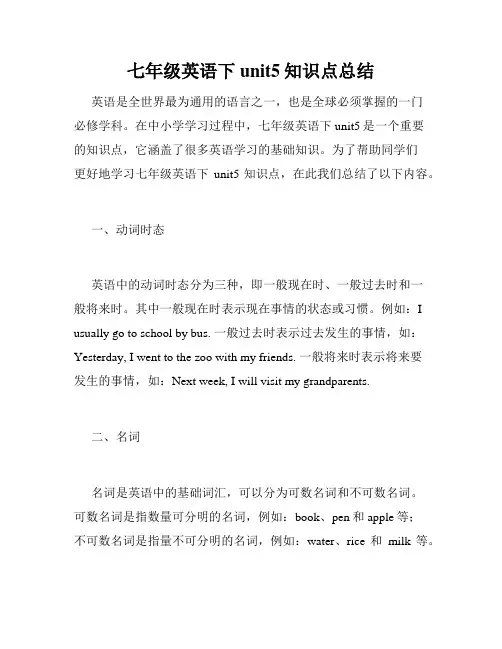
七年级英语下unit5知识点总结英语是全世界最为通用的语言之一,也是全球必须掌握的一门必修学科。
在中小学学习过程中,七年级英语下unit5是一个重要的知识点,它涵盖了很多英语学习的基础知识。
为了帮助同学们更好地学习七年级英语下unit5知识点,在此我们总结了以下内容。
一、动词时态英语中的动词时态分为三种,即一般现在时、一般过去时和一般将来时。
其中一般现在时表示现在事情的状态或习惯。
例如:I usually go to school by bus. 一般过去时表示过去发生的事情,如:Yesterday, I went to the zoo with my friends. 一般将来时表示将来要发生的事情,如:Next week, I will visit my grandparents.二、名词名词是英语中的基础词汇,可以分为可数名词和不可数名词。
可数名词是指数量可分明的名词,例如:book、pen和apple等;不可数名词是指量不可分明的名词,例如:water、rice和milk等。
在英语中,名词有单数和复数两种形式,根据单数和复数形式的不同,其变换方式也各有不同。
三、冠词英语中的冠词分为定冠词和不定冠词,定冠词是指唯一的或已知的事物,如:the book、the pen等;不定冠词是指没有具体指定的事物,如:a book、an apple等。
在具体使用中,要考虑词汇的前缀和音素等因素做出适当选择。
四、代词代词是指用来代替名词或名词短语的词汇,常见的代词有人称代词、指示代词、反身代词和不定代词等。
人称代词包括第一人称、第二人称和第三人称三种,如:I、you、he、she、it、we和they等。
五、形容词和副词形容词是用来修饰名词的词汇,如:beautiful、big、small等;副词则是用来修饰动词、形容词或其他副词的词汇,常用的副词有slowly、quickly、happily等。
在使用形容词和副词的时候,要注意它们的比较级和最高级的变换。
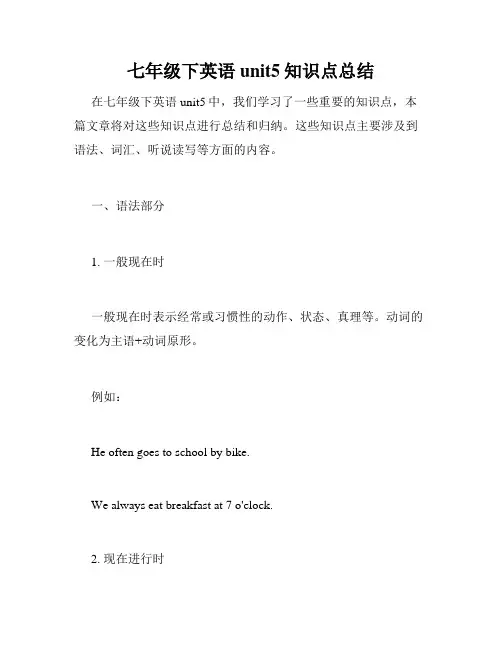
七年级下英语unit5知识点总结在七年级下英语unit5中,我们学习了一些重要的知识点,本篇文章将对这些知识点进行总结和归纳。
这些知识点主要涉及到语法、词汇、听说读写等方面的内容。
一、语法部分1. 一般现在时一般现在时表示经常或习惯性的动作、状态、真理等。
动词的变化为主语+动词原形。
例如:He often goes to school by bike.We always eat breakfast at 7 o'clock.2. 现在进行时现在进行时表示现在正在进行的动作。
动词的变化为主语+am/is/are+动词+ing。
例如:She is watching TV now.They are studying English at school.3. 形容词比较级和最高级形容词比较级和最高级分别表示两个或多个事物的比较和三个或三个以上事物的比较。
比较级的变化为形容词+er,最高级的变化为形容词+est。
例如:This book is more interesting than that one.Alice is the tallest girl in our class.二、词汇部分1. 动物本单元中,我们学习了一些动物的名称,如tiger(老虎)、panda(熊猫)、elephant(大象)等。
2. 食物本单元中,我们学习了一些食物的名称,如hamburger(汉堡包)、pizza(比萨饼)、hot dog(热狗)等。
3. 数字本单元中,我们学习了1-100之间的数字,并学习了如何表达时间和日期。
三、听说读写部分1. 听力在本单元中,我们进行了多次听力练习,包括听录音选单词、听录音选择应答语、听录音填空等。
这些练习有助于提高我们的听力理解能力。
2. 口语在本单元中,我们学习了如何用英语表达自己的观点、感受和交流。
我们进行了口语练习,如问答练习、角色扮演等,这些练习有助于提高我们的口语表达能力。
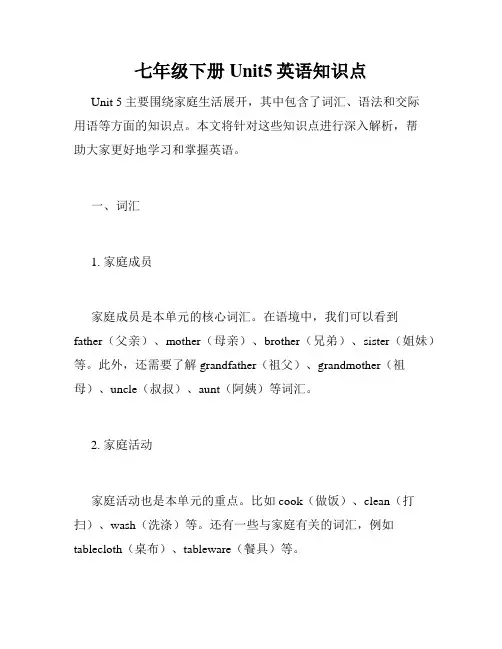
七年级下册Unit5英语知识点Unit 5主要围绕家庭生活展开,其中包含了词汇、语法和交际用语等方面的知识点。
本文将针对这些知识点进行深入解析,帮助大家更好地学习和掌握英语。
一、词汇1. 家庭成员家庭成员是本单元的核心词汇。
在语境中,我们可以看到father(父亲)、mother(母亲)、brother(兄弟)、sister(姐妹)等。
此外,还需要了解grandfather(祖父)、grandmother(祖母)、uncle(叔叔)、aunt(阿姨)等词汇。
2. 家庭活动家庭活动也是本单元的重点。
比如cook(做饭)、clean(打扫)、wash(洗涤)等。
还有一些与家庭有关的词汇,例如tablecloth(桌布)、tableware(餐具)等。
3. 身体部位在描述家庭成员时,需要用到一些身体部位的词汇,例如eyes (眼睛)、nose(鼻子)、mouth(嘴巴)等。
此外,还涉及到一些其他的身体部位,例如arm(胳膊)、leg(腿)、foot(脚)、shoulder(肩膀)等。
4. 时间在描述家庭活动时,时间也是必不可少的。
例如,weekend (周末)、Monday(周一)、Tuesday(周二)等。
我们还需要了解到一些表示时间段的词汇,例如morning(早上)、afternoon (下午)等。
二、语法1. 一般现在时在描述家庭活动和家庭成员时,我们需要用到一般现在时。
这是英语中最基础的时态之一。
一般现在时表示经常性事件、客观事实和习惯等。
例如,“Mary always gets up at six in the morning.”(玛丽总是早上六点起床。
)2. There be句型There be句型也是本单元的重点之一。
There be句型用来描述某个地方或某个场合的存在情况。
例如,“There is a sofa in the living room.”(客厅里有一张沙发。
)3. 祈使句祈使句是用来表达命令、请求、建议等意义的句子。
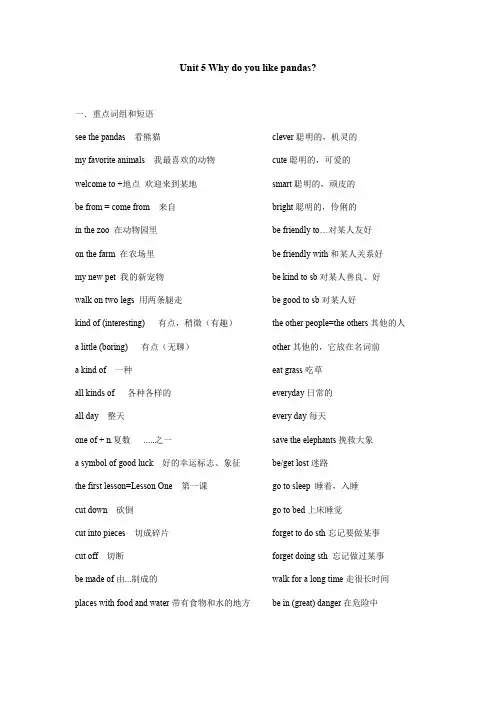
Unit 5 Why do you like pandas?一.重点词组和短语see the pandas 看熊猫clever聪明的,机灵的my favorite animals 我最喜欢的动物cute聪明的,可爱的welcome to +地点欢迎来到某地smart聪明的,顽皮的be from = come from 来自bright聪明的,伶俐的in the zoo 在动物园里be friendly to…对某人友好on the farm 在农场里be friendly with和某人关系好my new pet 我的新宠物be kind to sb对某人善良、好walk on two legs 用两条腿走be good to sb对某人好kind of (interesting) 有点,稍微(有趣)the other people=the others其他的人a little (boring) 有点(无聊)other其他的,它放在名词前a kind of 一种eat grass吃草all kinds of 各种各样的everyday日常的all day 整天every day每天one of + n.复数.....之一save the elephants挽救大象a symbol of good luck 好的幸运标志、象征be/get lost迷路the first lesson=Lesson One 第一课go to sleep 睡着,入睡cut down 砍倒go to bed上床睡觉cut into pieces 切成碎片forget to do sth忘记要做某事cut off 切断forget doing sth 忘记做过某事be made of由...制成的walk for a long time走很长时间places with food and water带有食物和水的地方be in (great) danger在危险中二.重点知识点讲解1.kind of表示“有点儿,稍微”,后面接形容词E.g. I’m kind of hungry(饥饿的).Koalas are kind of shy.—Why do you like pandas?—Because they are kind of interesting.▲kind作名词,表示“种类”。
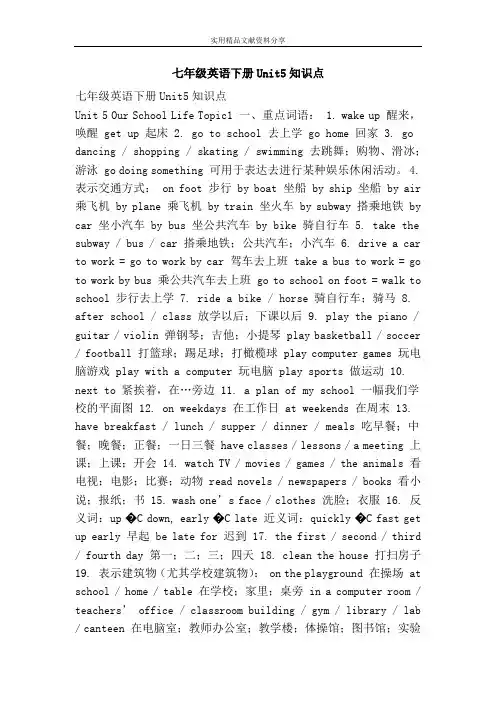
七年级英语下册Unit5知识点七年级英语下册Unit5知识点Unit 5 Our School Life Topic1 一、重点词语: 1. wake up 醒来,唤醒 get up 起床 2. go to school 去上学 go home 回家 3. go dancing / shopping / skating / swimming 去跳舞;购物、滑冰;游泳 go doing something 可用于表达去进行某种娱乐休闲活动。
4. 表示交通方式: on foot 步行 by boat 坐船 by ship 坐船 by air 乘飞机 by plane 乘飞机 by train 坐火车 by subway 搭乘地铁 by car 坐小汽车 by bus 坐公共汽车 by bike 骑自行车 5. take the subway / bus / car 搭乘地铁;公共汽车;小汽车 6. drive a car to work = go to work by car 驾车去上班 take a bus to work = go to work by bus 乘公共汽车去上班 go to school on foot = walk to school 步行去上学 7. ride a bike / horse 骑自行车;骑马 8. after school / class 放学以后;下课以后 9. play the piano / guitar / violin 弹钢琴;吉他;小提琴 play basketball / soccer / football 打篮球;踢足球;打橄榄球 play computer games 玩电脑游戏 play with a computer 玩电脑 play sports 做运动 10. next to 紧挨着,在…旁边 11. a plan of my school 一幅我们学校的平面图 12. on weekdays 在工作日 at weekends 在周末 13. have breakfast / lunch / supper / dinner / meals 吃早餐;中餐;晚餐;正餐;一日三餐 have classes / lessons / a meeting 上课;上课;开会 14. watch TV / movies / games / the animals 看电视;电影;比赛;动物 read novels / newspapers / books 看小说;报纸;书15. wash one’s face / clothes 洗脸;衣服 16. 反义词:up �C down, early �C late 近义词:quickly �C fast get up early 早起 be late for 迟到 17. the first / second / third / fourth day 第一;二;三;四天 18. clean the house 打扫房子19. 表示建筑物(尤其学校建筑物): on the playground 在操场 at school / home / table 在学校;家里;桌旁 in a computer room / teachers’ office / classroom building / gym / library / lab / canteen 在电脑室;教师办公室;教学楼;体操馆;图书馆;实验室;食堂20. around six o’clock = at about six o’clock 大约在六点 21. 频率副词:never, seldom, sometimes, often, usually, always 二、重点句型:1. It’s time to get up. 该起床的时候了。
七年级英语下unit5知识点归纳Unit5是七年级英语教材中的一个重要单元,本单元的主要内容是关于体育和健康的话题,通过学习Unit5,学生能够掌握有关运动、饮食、健康和日常生活的相关英语表达。
一、词汇1.关于体育方面的词汇例如:swim, run, jump, throw, catch等。
2.与饮食相关的词汇例如:fruit, vegetable, meat, milk, water, bread, egg等。
二、语法1. 一般现在时常用于描述经常性、习惯性的动作,例如:I usually get up at 6:00 am.2. 频率副词常用的频率副词有:always, usually, often, sometimes, rarely, never等。
例如:I always eat breakfast before going to school.3. 物主代词常用的物主代词有:my, your, his, her, its, our, their等。
例如:My brother and I like playing basketball.三、交际用语1. 问答方式例如:What do you like doing in your free time? I like playing computer games.2. 建议和请求例如:Can you help me with my English homework? Sure, I'd love to.四、阅读技巧在阅读英语文章时,需要注意以下几点:1. 注意抓住文章的主旨意思,避免陷入细节中无法自拔。
2. 学会通过上下文推测单词的意思。
3. 多看英语文章进行阅读训练,不断提高阅读速度和理解能力。
五、口语表达学习英语口语需要注重以下几点:1. 把握好语音和语调的准确性。
2. 积累常用口语表达,例如:Hello, how are you? / I'm fine, thank you.3. 练习听力和口语,多模仿和使用,自然而流畅。
七年级下册unit5 知识点总结知识点总结
七年级下册unit5涉及的知识点涵盖了英语学习中的基础语法
和常用词汇,下面将对这些知识点进行总结。
一、动词的时态
本单元主要介绍了一般过去时和一般现在时。
在一般过去时中,动词需要加上-ed或者是变化为其它规则;而在一般现在时中,动
词加s或es,或者是变化为其它规则。
同时,这两个时态之间也
有特殊用法需要注意。
二、名词的单复数
名词单复数是英语语法中最基础的部分之一。
在本单元中,我
们学习了名词单数和复数的规则以及可数名词与不可数名词的区别。
对于不规则的名词复数形式也需要进行重点记忆。
三、形容词和副词
形容词是修饰名词的词,可以用来描述事物的大小、颜色、形
状等特征。
在本单元中,我们学习了一些常见的形容词及其用法。
副词是一种修饰动词、形容词、副词或整个句子的词。
在本单元中,我们还学习了一些常见的副词及其用法。
四、介词
介词用来描述名词与名词之间或动词与名词之间的关系,但是
这种关系并不是所有介词都适用的。
在本单元中,我们学习了一
些常见的介词和它们的用法,需要在日常使用中进行加强记忆。
五、常用词汇
本单元中还涉及了一些常见的词汇,如颜色、数字、天气等。
这些词汇不仅在日常生活中常见,同时在阅读、听力以及口语考
试中也应用广泛。
可以通过词汇表或者记忆卡片来进行巩固和加
强记忆。
总之,英语学习一定要注重基础,只有基础打好了,才能为后面的英语学习打下更坚实的基础。
人教七年级下册英语U5知识点Unit 5 My school day本单元介绍了日常学习生活中的一些常用句子及单词,本文将总结一些本单元的重点内容,以帮助学生们更好地掌握英语知识。
1.学校设施学校设施在日常生活中是常用的单词,如:library, laboratory, classroom等,还有playground,即操场。
学生们可以运用这些单词来描述自己的学校,如:Our school has a big library.或We usually play basketball on the playground after class.2.时间和动词时间和动词是英语语言中的重要部分。
在本单元中,有一些常用动词,如:get up, have breakfast/lunch/dinner, go to bed等。
学生们可以运用这些单词来描述自己的日常生活,如下:I usually get up at 6:30 in the morning.I have breakfast at 7 o'clock.I go to bed at 10 o'clock at night.3.日常活动在学习英语的过程中,日常活动也是常用语句。
在本单元中,有一些常用语句,如:It's time to..., I take..., I play..., I do..., 等。
学生们可以运用这些常用语句来叙述自己的日常生活,如下:It's time to go to school now.I take a bus to school every morning.I usually play basketball with my friends after school.I do my homework before dinner.4.一般现在时的动词变化一般现在时在英语语言中也是十分常见的。
(完整版)人教版七年级英语下册第五单元知识点总结人教版七年级下册英语第五单元Unit5 Why do you like pandas? 知识要点重要短语like…a lot 非常喜欢… black and white 黑白相间 all day整天Let’s do= let us do 让我们做……kind of 有点儿,稍微 South Africa南非be from/come from 来自于save the elephants救助大象one of…其中之一a symbol of good luck好运的象征 get lost迷路 cut down 砍倒for a long time 很长时间in great danger处于(极大)危险之中things be made of ivory由象牙制成的东西places with food and water有食物和水的地方kill……for……为……杀1.see the pandas 看熊猫2.my favorite animals我最喜欢的动物3.welcome to sp 欢迎来某地4.welcome back to sp 欢迎回到某地5.be from 来自/doc/83d58b480540be1e650e52ea551810 a6f424c84e.html e from来自7.in the zoo 在动物园里8.on the farm 在农场里9.my new pet 我的新宠物10.walk on two legs 用两条腿走11.kind of有点12.kind of interesting有点有趣13.a little有点14.a little boring有点无聊15.a kind of一种16.all kinds of 各种各样的17.all day整天18.a good name for sb对某人是一个好名字19.South Africa南非20.South China华南21.South America南美洲22.America, the USA美国23.the UK ,England英国24.the South Pole南极25.what animals什么动物26.save the elephants挽救大象27.one of +n复数。
七年级英语(下册)Unit5重点词汇和重点短语一、词汇攻关1.building(n.)→build(v.&n.)建筑;体格→built(过去式/过去分词)建造,建设→builder(n.)建立者;建筑者★build sb.sth./build sth.for sb.为某人建造某物★build up建立;增进;增强★of strong build体格健壮的2.train(n.&v.)→trained(adj.)受过训练的;熟练的→trainee(n.)受训练者;实习生→trainer(n.)运动鞋;教练员;驯兽师→training(n.)训练;锻炼;培养;驯化★train sth./sb.to do sth.训练……做……★train for为……接受训练★train as作为……接受训练3.catch(v.)→caught(过去式/过去分词)赶上★catch a cold感冒★catch up with追上,赶上★catch fire着火★catch the train/plane赶上火车/飞机★be caught in the rain淋雨4.ride(v.&n.)→rode(过去式)→ridden(过去分词)骑★give sb.a ride捎某人一程5.watch(v.)→watches(第三人称单数)→watched(过去式/过去分词)观看;当心→watch(n.)表,手表★watch out当心★keep watch(for sth.)看守,警惕★on watch值班★watch TV看电视6.begin(v.)→began(过去式)→begun(过去分词)→beginning(现在分词&n.)开始;开端→beginner(n.)初学者;生手;创始者★begin doing/to do sth.开始做某事★begin with以……作为开始★in the beginning最初,起初★from beginning to end从头到尾7.swim(v.)→swam(过去式)→swum(过去分词)→swimming(现在分词)游泳→swimmer(n.)游泳者★go swimming去游泳★go for a swim去游泳8.listen(v.)→listening(现在分词)听→listener(n.)听者;听众★listen to听;倾听★listen for留神听9.music(n.)→musical(adj.)音乐的→musician(n.)乐手,音乐家,乐师10.talk(n.&v.)→talker(n.)说话者→talkative(adj.)爱说话的,健谈的★talk to/with sb.与某人交谈,谈话★talk about/on…谈论……★talk back(to sb.)顶嘴,回嘴★talk to oneself自言自语★give a talk演讲,讲话11.make(v.)→made(过去式/过去分词)做,制造;使成为→maker(n.)生产者,制造者→making(n.)制作;制造★make sb.sth./make sth.for sb.为某人制作某物★make up编造;和解;化妆;弥补★make it设法安排;成功12.boring(adj.)→bore(v.)使厌烦→bored(adj.)无聊的,无趣的★be bored with sth.对……感到厌烦13.clean(v.&adj.)→cleaning(现在分词)→cleaned(过去式/过去分词)打扫→cleaner(n.)清洁工;吸尘器★do some cleaning打扫卫生★clean up清除;打扫干净14.run(v.)→ran(过去式)→run(过去分词)→running(现在分词)跑→runner(n.)跑步者★run after追赶;追求★run about到处跑15.use(v.&n.)→used(过去式/过去分词)用,使用→user(n.)使用者→useful(adj.)有用的→useless(adj.)无用的★used to do sth.过去常常做某事★be used to doing sth.习惯于做某事★be used to do sth.被用来做某事★come into use开始使用★be in use使用中★use your head动动脑子★make use of利用;使用16.shelf(n.)→shelves(pl.)搁板,搁架→bookshelf(n.)书架17.keep(v.)→kept(过去式/过去分词)保存;保持→keeper(n.)看守人;守卫;守门员★keep away from远离;避开★keep doing sth.持续做某事★keep sb.from doing sth.阻止某人做某事★keep up with跟上18.sit(v.)→sat(过去式/过去分词)→sitting(现在分词)坐★sit down就座,坐下★sit up坐起来;使坐起来19.write(v.)→wrote(过去式)→written(过去分词)写→writer(n.)作家,作者★reading and writing阅读与写作★write(a letter)to sb.给某人写信★write back to sb.给某人回信★write down写下,记下20.wonderful(adj.)→wonder(v.)想知道;感到惊讶→wonder(n.)惊讶;奇迹→wonderfully(adv.)不可思议地;绝妙地★no wonder不足为奇21.history(n.)→historical(adj.)历史的;历史学的;与历史有关的→historic(adj.)有历史意义的;历史上著名的;历史性的22.few(adj.&pron.)→fewer(比较级)较少的→fewest(最高级)最少的★a few几个,一些23.science(n.)→scientist(n.)科学家→scientific(adj.)科学的,有关科学的★science fiction科幻小说24.easy(adj.)→easily(adv.)容易地→easier(比较级)较容易的→easiest(最高级)最容易的→hard/difficult(反义词)困难的★take it easy别紧张25.interesting(adj.)→interested(adj.)感兴趣的→interest(n.&v.)兴趣,爱好;利益,利息;权益;使感兴趣★be/get/feel interested in对……感兴趣★show/have(an)interest in…对……有兴趣★lose interest in…对……失去兴趣★with interest饶有兴趣地26.difficult(adj.)→difficulty(n.)困难★have difficulty(in)doing sth.做某事有困难★without difficulty毫不费力地;轻而易举地27.learn(v.)→learnt/learned(过去式/过去分词)学习,学会;获悉→learner(n.)学习者,初学者★learn to do sth.学会做某事★learn from…从/向……学习★learn sth.by oneself自学★learn…by heart用心学……;背下来28.activity(n.)→activities(pl.)活动★outdoor activities户外运动29.study(v.&n.)→studies(第三人称单数)→studied(过去式/过去分词)学习;研究→study(n.)书房30.early(adj.)→early(adv.)早;提早→earlier(比较级)较早的→earliest(最高级)最早的→late(反义词)迟到的;晚的★catch the early bus赶上早班车★early in the morning清早31.late(adj.)→late(adv.)迟到→lately(adv.)近来★be late for doing sth.做某事迟到了★in the late afternoon傍晚★later in the afternoon下午的晚些时候二、重点短语1.come on快点儿;加油;来吧2.go to school on foot/walk to school步行去上学3.at school在学校,在上课4.the Great Wall长城5.make room for为……腾出个地儿6.dining hall餐厅7.at the school gate在学校门口8.by bus/car/subway乘公共汽车/小汽车/地铁9.on weekdays在工作日10.take the bus/train/plane/car乘坐公交车/火车/飞机/小汽车11.listen to music听音乐12.do one's homework做家庭作业13.go to bed上床睡觉14.the same to you你也一样15.three times a week一周三次16.do some cleaning打扫卫生17.ride a bike骑自行车18.once/twice a week每周一次/两次19.know about了解,知道20.on Thursday morning在周四上午21.be over结束22.in one's free time在某人的业余时间23.play cards打扑克牌24.classroom building教学楼25.on time按时;准时26.borrow…from…从……借来……27.show sb.around带某人参观28.have a soccer game有一场足球赛29.in the swimming pool在游泳池30.write(a letter)to sb.给某人写信31.at the back of…在……的后面32.have an English class上英语课33.learn about the past了解过去34.a map of China一幅中国地图35.work on math problems算数学题36.be kind to sb.对某人友好37.some other subjects一些别的科目38.different kinds of…不同种类的……39.watch a movie/see a film看电影40.study English grammar学习英语语法41.care about关心;在乎42.play computer games玩电脑游戏三、重点句型1.It's time for e on!上课时间到了,快点!2.I seldom walk to school.我很少步行上学。
人教七年级下unit5知识点在人教七年级下unit5课程中,我们学习了关于“食物和饮料”这一主题的知识点。
以下是本单元主要的知识点:一、单词和短语1. 食物:fruit, vegetables, chicken, fish, bread, rice, noodles, milk, cheese, cake 等。
2. 饮料:water, juice, tea, coffee, cola, lemonade 等。
3. 特殊饮食需求:vegetarian(素食主义者), vegan(纯素食主义者)等。
4. 食物和饮料的数量:a glass of milk, a cup of tea, a bottle of water, a loaf of bread 等。
二、语法1. 倒装句:在英语中,为了强调某些语句内容,常使用倒装句。
例如:Never have I seen such a beautiful sunset.(我从未看过如此美丽的日落。
)2. 疑问句类型:在英语中,疑问句有两种类型,一种是一般疑问句,以助动词开头,另一种是特殊疑问句,以特殊疑问词开头。
例如:Do you like apples?(你喜欢苹果吗?)What kind of food do you like?(你喜欢什么食物?)三、口语表达1. 询问对方喜欢什么食物、饮料等:What kind of food/drink do you like?2. 询问对方是否饱了:Are you full?3. 表达自己的饮食要求:I am a vegetarian.4. 发表自己对食品的看法:I love pizza. It's delicious.以上就是本单元的主要知识点,希望同学们能够通过学习,掌握这些基础的英语单词和语法知识,为今后更高层次的英语学习打下坚实的基础。
7 Series FPGAs Overview
参考ds180_7Series_Overview.pdf。
1.General Description
7系列包括Artix 7、Kintex 7和Virtex 7。
其中Artix 7面向较低端应用,功耗低,价格低,封装小;Kintex 7面向中端应用,性价比更高,性能约比Artix 7提高2倍;Virtex 7面向高端应用。
采用28nm工艺。
2.Summary of 7 Series FPGA Features
●Real 6-input look-up table(LUT) technology configurable as distributed memory.
●SelectIO technology with support for DDR3 interfaces up to 1866Mb/s.
●600Mb/s to 6.6Gb/s up to 28.05Gb/s.
●包括一个用户可配置的ADC(双12位,1MSPS的ADC),芯片内部集成热和电源传感器。
●DSP slices with 25×18 multiplier, 48-bit accumulator, and pre-adder.
●Powerful clock management tiles(CMT), combining phase-locked loop(PLL) and mixed-mode clock manager(MMCM) blocks for high precision and low jitter.
●支持PCIe的endpoint和root port,支持gen3。
● 1.0V核电压,当需要达到更低的功耗时,可配置0.9V核电压。
3.CLBs, Slices, and LUTs
7系列的FPGA可将任意一个查找表配置为6输入查找表(64bit ROM),或配置为2个5输入查找表(32bit ROM)。
这两个5输入查找表共享地址和逻辑输入,每个查找表的输出有一个可选寄存器。
4个6输入LUT,8个寄存器以及相应的乘法器、算数进位逻辑组成一个slice,2个slice。